外研版九年级英语下册 Module 1 Travel Unit 3 Language in use 课件 (共73张PPT)
文档属性
| 名称 | 外研版九年级英语下册 Module 1 Travel Unit 3 Language in use 课件 (共73张PPT) | 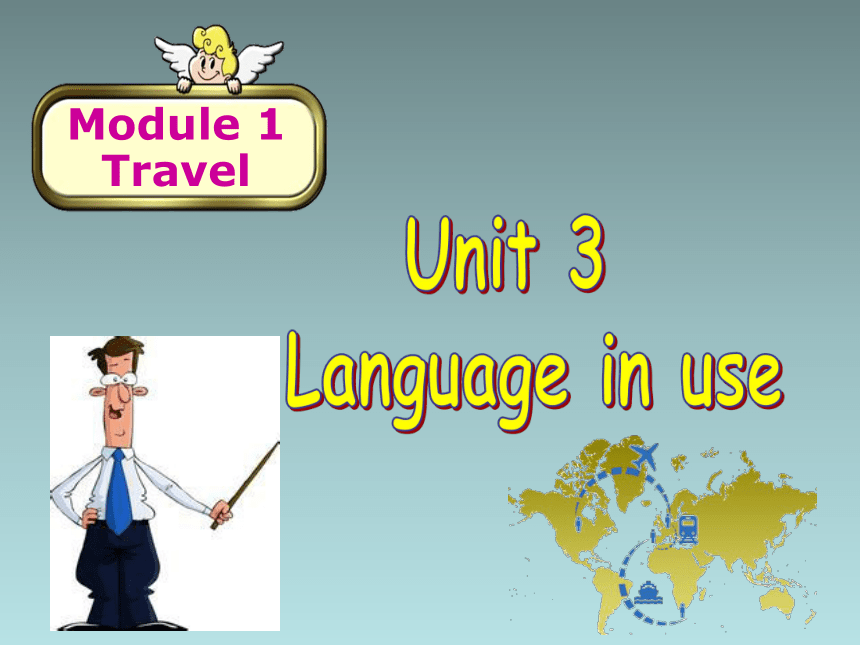 | |
| 格式 | ppt | ||
| 文件大小 | 2.2MB | ||
| 资源类型 | 教案 | ||
| 版本资源 | 外研版 | ||
| 科目 | 英语 | ||
| 更新时间 | 2022-08-16 07:32:34 | ||
图片预览

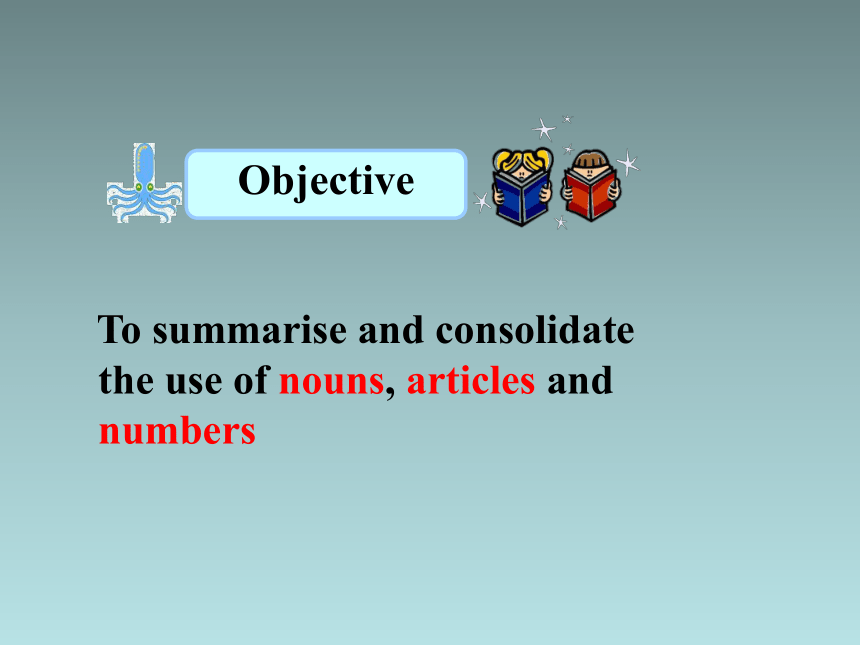
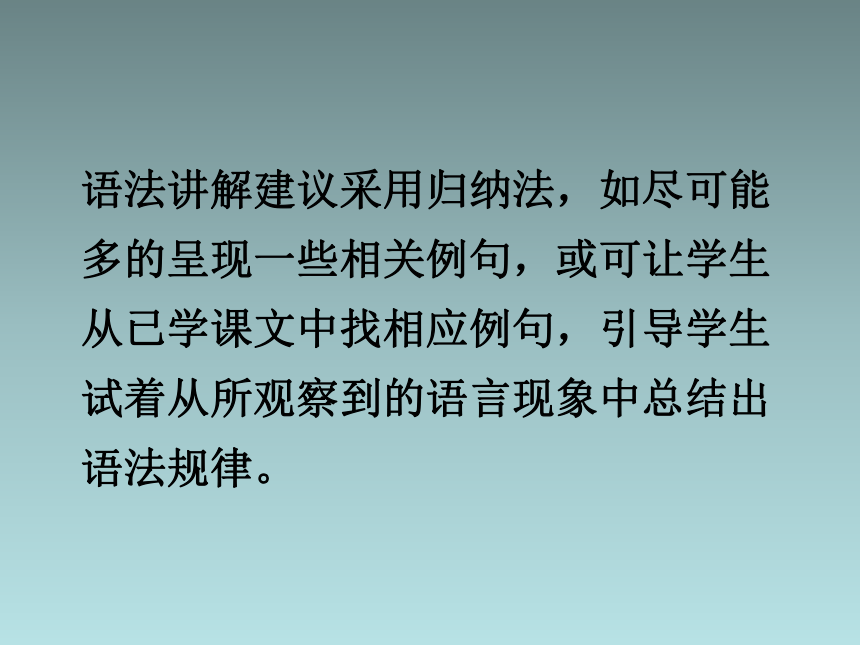

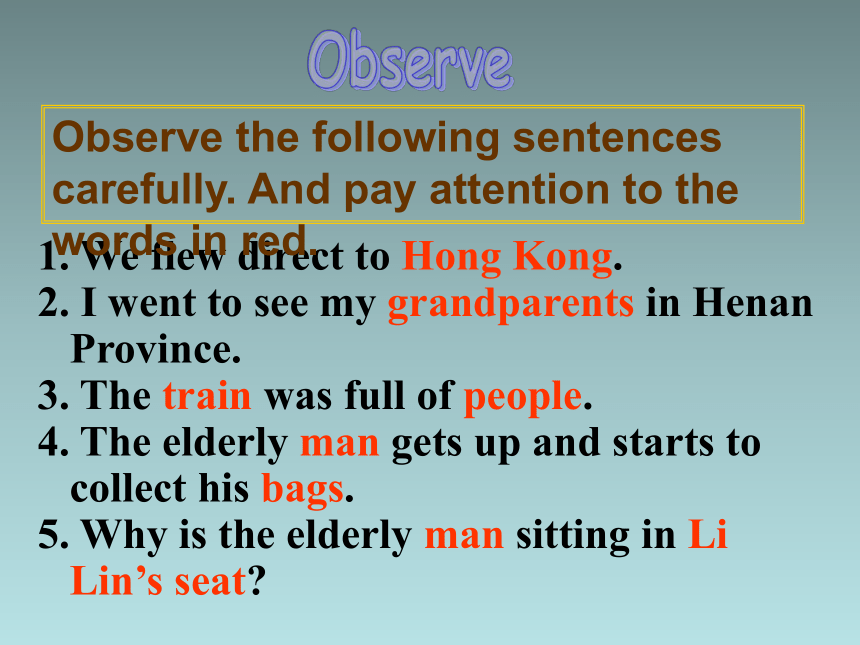
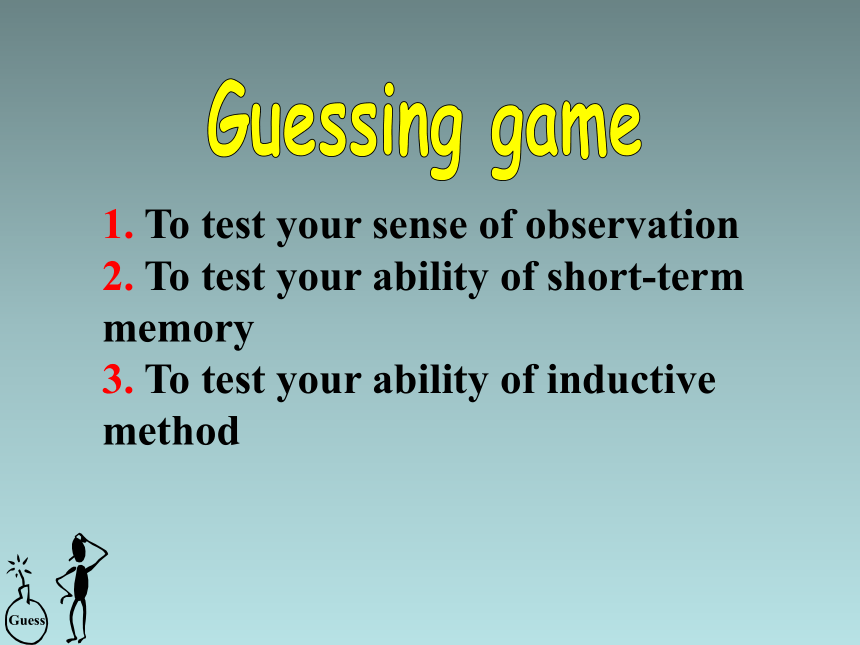
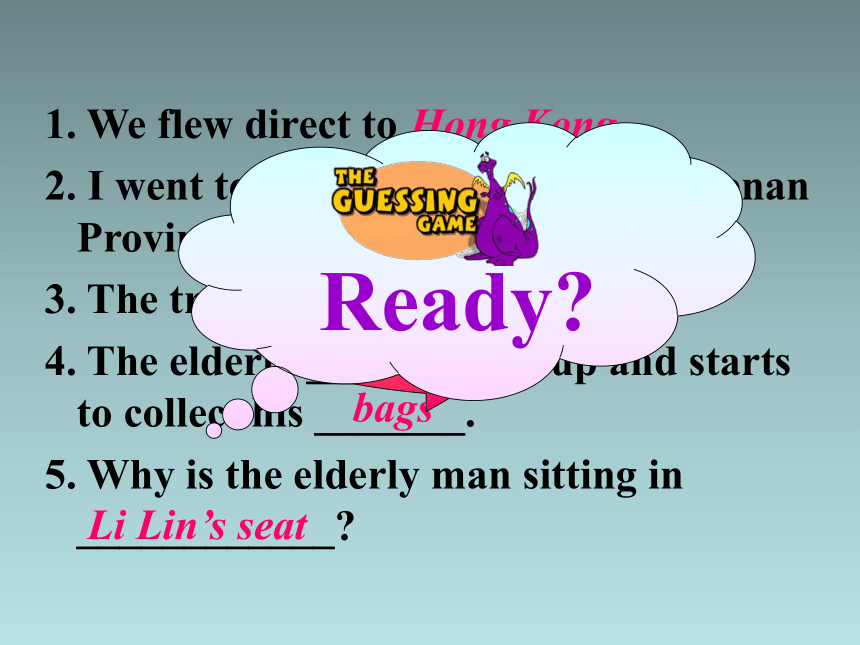

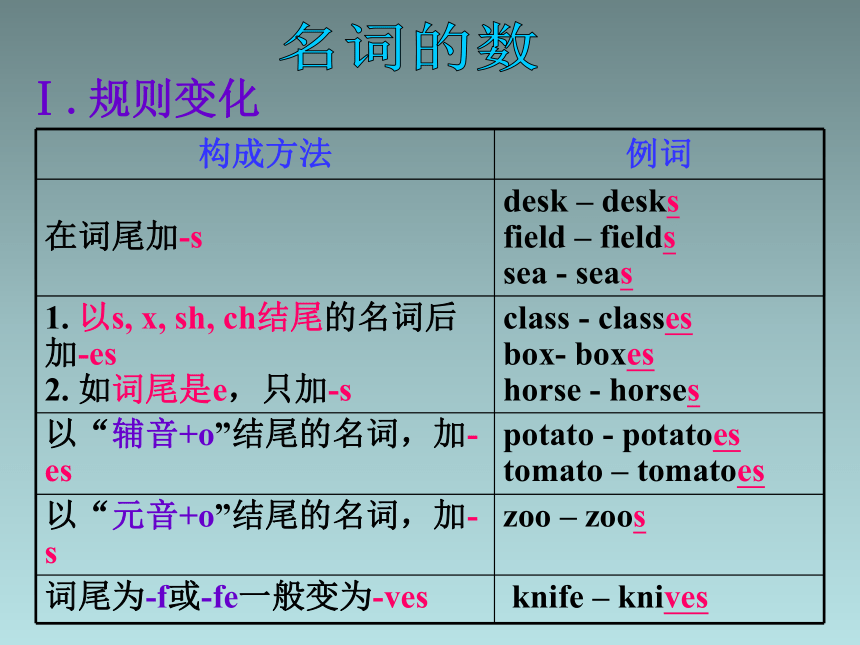
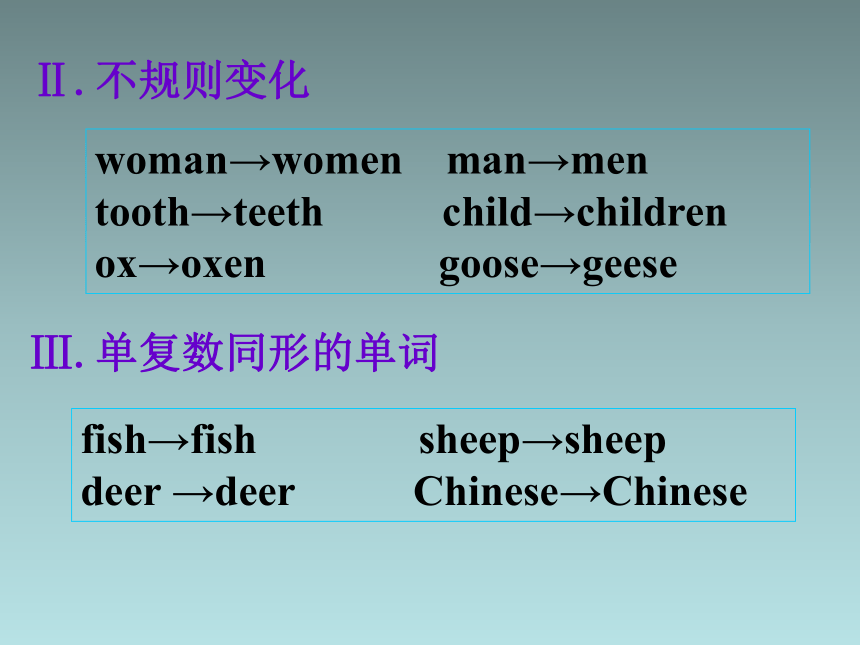
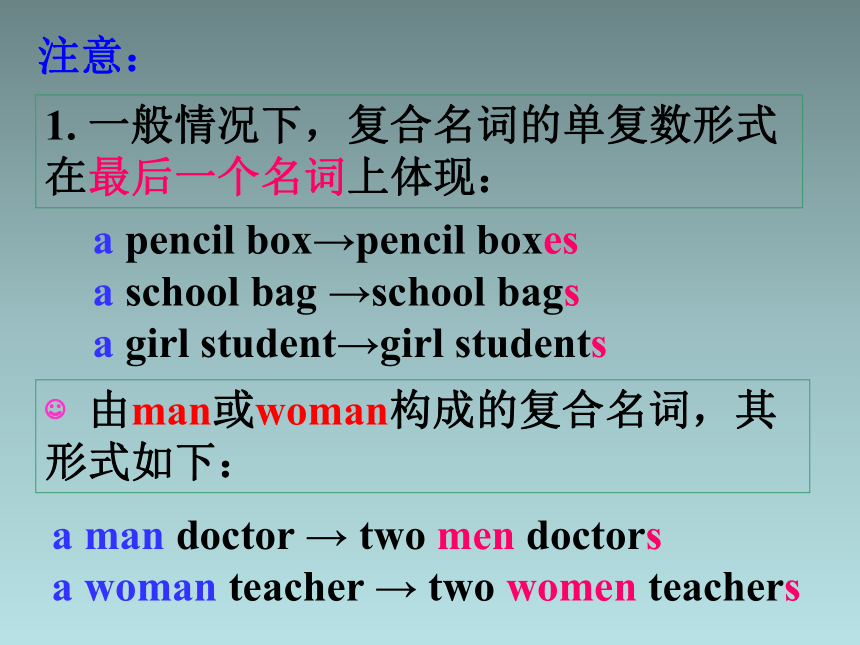

文档简介
(共73张PPT)
Module 1
Travel
To summarise and consolidate the use of nouns, articles and numbers
Objective
语法讲解建议采用归纳法,如尽可能多的呈现一些相关例句,或可让学生从已学课文中找相应例句,引导学生试着从所观察到的语言现象中总结出语法规律。
1. We flew direct to Hong Kong.
2. I went to see my grandparents in Henan Province.
3. The train was full of people.
4. The elderly man gets up and starts to collect his bags.
5. Why is the elderly man sitting in Li Lin’s seat
Observe the following sentences carefully. And pay attention to the words in red.
1. To test your sense of observation
2. To test your ability of short-term memory
3. To test your ability of inductive method
Guess
1. We flew direct to __________.
2. I went to see my ___________ in Henan Province.
3. The train was full of ________.
4. The elderly _______ gets up and starts to collect his _______.
5. Why is the elderly man sitting in ____________
Hong Kong
grandparents
man
bags
Li Lin’s seat
people
go
Ready
名词的分类
专有名词:姓名,国家,语言,月份,星期,节日,大学等
普通名词
可数名词
(有单复数之分)
个体名词
集体名词
不可数名词
(没有复数形式)
物质名词:自然物质,食品、饮料等
抽象名词:情感,学科,概念等
(某类人或东西中的个体)
(若干个个体组成的集合体)
(无法分为个体的实物)
名词
Ⅰ.规则变化
构成方法 例词
在词尾加-s desk – desks
field – fields
sea - seas
1. 以s, x, sh, ch结尾的名词后加-es
2. 如词尾是e,只加-s class - classes
box- boxes
horse - horses
以“辅音+o”结尾的名词,加-es potato - potatoes
tomato – tomatoes
以“元音+o”结尾的名词,加-s zoo – zoos
词尾为-f或-fe一般变为-ves knife – knives
woman→women man→men tooth→teeth child→children ox→oxen goose→geese
Ⅲ.单复数同形的单词
Ⅱ.不规则变化
fish→fish sheep→sheep
deer →deer Chinese→Chinese
1. 一般情况下,复合名词的单复数形式在最后一个名词上体现:
a man doctor → two men doctors
a woman teacher → two women teachers
由man或woman构成的复合名词,其形式如下:
a pencil box→pencil boxes
a school bag →school bags
a girl student→girl students
注意:
3. 有些名词表达复数概念,常作为一个整体看待,如police, people。这些单词没有复数形式,但其后的谓语动词却多为复数形式。如:
2. 有些名词总是以复数形式出现,如 trousers, glasses (眼镜),它们在表示数量时需要借助量词来表示,如:
a pair of trousers, three pairs of trousers,
a pair of glasses.
The police have caught the thief.
警察抓到了那个贼。
Many people have seen the film.
很多人看了这部电影。
如果要表达单个数量只能换用其他单词,如:
一名警察 a policeman/policewoman
一个人 a person/a man/a woman
注意:people作“民族,种族”解时,是可数名词,复数形式是peoples。
1) n. + ’s
采用此方式的多为有生命的名词,如:men’s clothes, someone’s bag;
以-s结尾的复数名词的所有格直接加 ’ 即可。如:
the boys’ school bags
the teachers’ office
the six students’ dormitory
名词的所有格有两种表达方式:
2) of + n.
无生命的名词所有格多采用此方式来表达,如:
the window of the house
the end of the week
the gate of our school
the square of the city
the capital of our country
the wall of the town
the door of the classroom
名词的句法功能指名词可以充当的句子成分,常见的有:
主语
The flight takes about thirteen hours.
航程需要大约13个小时。
Mr Wang teaches us English.
王老师教我们英语。
2) 宾语
Many people were helping the old man when I passed.
我路过的时候,许多人在帮助这位老人。
He has become very interested in chess recently.
最近他对国际象棋产生了很大的兴趣。
3) 宾语补足语
We all call him Xiao Li.
我们都叫他小李。
4) 表语
My younger brother is a policeman.
我弟弟是警察。
5) 名词还可以用作同位语、呼语等。如:
Mr Wang, my neighbour, has bought a new car.
我的邻居王先生买了辆新车。
(my neighbour 是Mr Wang 的同位语)
Tom, come and play games with us.
汤姆,来和我们玩游戏吧。
(Tom 是呼语)
1. He went to stay with his family in the UK.
2. Why is travel so difficult in winter
3. We took a tour by coach to the Summer Palace.
4. Then we took a boat to Lantau Island and went to Disneyland.
5. It’s the busiest season in China because of the Spring Festival.
Observe the following sentences carefully. And pay attention to the words in color.
1. To test your sense of observation
2. To test your ability of short-term memory
3. To test your ability of inductive method
Guess
1. He went to stay with his family in ______ UK.
2. Why is travel so difficult in _______ winter
3. We took a tour by coach to _______ Summer Palace.
4. Then we took ______ boat to ______ Lantau Island and went to _______ Disneyland.
5. It’s the busiest season in ______ China because of _______ Spring Festival.
/
the
a
/
/
/
the
the
go
Ready
冠词
冠词是虚词,本身不能单独使用,也没有词义,它用在名词的前面,帮助指明名词的含义。英语中的冠词有三种:
定冠词 the
不定冠词 a/an
零冠词 (即不用冠词)
单数可数名词前一定要用冠词
a/an
泛指单一、每一、任一事物
指类别
the
特指
指类别
上文提到过的人或事物
被限制性修饰语限定的人或事物
说话双方默认的人或事物
世上独一无二的事物
各种冠词的用法
复数可数名词/不可数名词前
the
上文提到的人或事物
被限制性修饰语限定的人或事物
说话双方默认的人或事物
零冠词
泛指的人或事物
指类别
③ 指某人某物,但并不具体指哪个人
或哪个物
① 表示某一类中的“一个”
② 表示“每一”
He is a soldier.
It isn’t easy to run a country well.
She is an honest woman.
I go to the cinema once a month.
We have five English lessons a week.
A reporter tells us the fact.
Lend me a storybook.
⑥ 在一些固定词组中
④ 表示数量“一”,但概念没有one强烈
⑤ 表示“同一”的意思
I have a mouth, a nose and two eyes.
It is an inch thick.
These shoes are all of a size.
The people and army are of a family.
have a good time a piece of
a lot of a few
have a cold have a rest
1)特指某(些)人或某(些)事物:
This is the house where Luxun once lived. The old man with thick glasses is their
history teacher.
2)指谈话双方都知道的人或事物:
Take the medicine.
3)复述上文提过的人或事物:
He bought a house. I’ve been to the house.
定冠词表示特指, 可以用于可数名词之前,也可用于不可数名词前。
4) 由普通名词构成的专有名词:
the USA the Communist Party the Great Wall the Internet
5) 用于独一无二的事物前:
the sun the earth the moon the world
The sun rises in the east. The moon is far smaller than the earth.
The earth goes round the sun.
6) 在河流、湖泊、山脉等前面:
the Yellow River the Black Sea
7) 表示“某某一家人或某某夫妇”:
the Greens the Browns
8) 用在方位名词前:
in the south in the west
in the north in the east
9) 定冠词用在形容词前, 表示一类人或
东西:
the rich the poor
the old the young
the living
10) 用在乐器名词前(play, like等动词后) :
the piano, the violin, the flu, the guitar
11) 用在习惯性短语中:
in the morning in the afternoon
go to the theatre
12) 用在有限定性后置定语的人或物前:
The man standing by the gate is Li Feng.
13) 代替所有格代词, 表示人体的一部分:
She caught me by the arm. John’s brother took him by the hand.
14) 在世纪、年代名词前加the:
in the 1980s 或 in the 1980’s
20世纪80年代 in the nineteenth century
十九世纪
1. 在名词前已有作定语的指示代词、物主代词、不定代词或名词所有格时:
this, my, that, those, these, her + 名词
2. 在表示一类人或事物的复数名词前:
Horses are useful animals. They are teachers.
3. 在称呼语或表示头衔的名词前:
Miss Gao Mr Green
一般来说,不可数名词和可数名词用复数表示泛指时不用冠词。
4. 在三餐饭和球类运动的名称前:
breakfast lunch supper
play football/basketball/volleyball/chess
5. 在物质名词、抽象名词前不用冠词,
但后有定语修饰时需加the:
The desk is made of wood. He is fond of music. The music of the film is very beautiful.
6. 在不可数名词和专有名词(月份, 星期, 季节等)前不用冠词:
Canada Lei Feng Hade Park Class Three Sunday summer
Observe the following sentences carefully. And pay attention to the words in red.
1. This is Seat 12A, but you should be in Car 9. This is Car 8.
2. …and I had to stand for over three hours!
3. I was surprised at how big it was: 3.6 kilometres long and 348 metres high.
4. It’s over 2,600 kilometres long.
5. On 1st May, Greek people celebrate Labour Day.
1. To test your sense of observation
2. To test your ability of short-term memory
3. To test your ability of inductive method
Guess
1. This is Seat _____, but you should be in Car _____. This is Car ______.
2. …and I had to stand for over ______ hours!
3. I was surprised at how big it was: _______ __________ long and _______ _______ high.
4. It’s over _______ _________ long.
5. On ______ (one) May, Greek people celebrate Labour Day.
9
8
three
3.6 kilometres
348
metres
2,600 kilometres
12A
1st
go
Ready
基数词
序数词
数量
顺序
表示数目和顺序
数词
①1-12, 独立成词。
one two three four five six seven
eight nine ten eleven twelve
②13-19, 由3-9 + teen构成。
14–fourteen 16–sixteen
17–seventeen 19–nineteen
特殊拼写:
13– thirteen 15–fifteen 18–eighteen
基数词表示人或物数量的多少。
一、概念:
二、基数词的读写:
③20-90, 以-ty结尾。
20—twenty 30 —thirty
40—forty 50—fifty
60 —sixty 70 —seventy
80 —eighty 90—ninety
④21-99, 两位数, 十位与个位之间加“-”。
21 twenty-one 55 fifty-five
99 ninety-nine
⑤ 101—999,三位数,百位与十位/个位之间加and。
101 one hundred and one
840 eight hundred and forty
693 six hundred and ninety-three
⑥ 1,000以上数目, 从右向左每三位用“ , ”
分开, 分别读为 thousand, million, billion。
6
,
500
,
431
,
7
29
billion
million
thousand
hundred
and
⑦hundred, thousand, million的用法:
当hundred, thousand, million等词前有具体数词修饰时,用单数。如:Our country has a population of 1,300 million people.
B. 表示上百、上千、上百万时,用
hundreds of, thousands of,
millions of 来表示。
After the war, thousands of people became homeless.
序数词表示事物的先后顺序,往往与定冠词the连用。
一、概念:
① 一般来说,是由相应的基数词加词尾th
构成。例: ◇ four + th → fourth ◇seven+th→ seventh
◇ ten + th → tenth
② 下面这些基数词在变为序数词时,有特
殊的变化。例: ◇ one → first ◇ two → second
◇ three → third ◇ five → fifth
◇ eight → eighth ◇ nine → ninth
◇ twelve → twelfth
二、序数词的读写:
③ 十位整数序数词的构成方法是将基数词
的词尾y变成i,然后再加eth。例: ◇ twenty → twentieth ◇ thirty → thirtieth ◇ forty → fortieth ◇ ninety → ninetieth
④ 两位或两位以上的基数词变成序数词
时,仅将个位数变成序数词。例: ◇ twenty-one → twenty-first ◇ thirty-five → thirty-fifth ◇ a hundred and fifty-three →
a hundred and fifty-third
Cardinal numbers Ordinal numbers
1 one 1st = first
2 two 2nd = second
3 three 3rd = third
4 four 4th = fourth
5 five 5th = fifth
6 six 6th = sixth
7 seven 7th = seventh
8 eight 8th = eighth
9 nine 9th = ninth
10 ten 10th = tenth
11 eleven 11th = eleventh
12 twelve 12th = twelfth
Cardinal numbers Ordinal numbers
13 thirteen 13th = thirteenth
14 fourteen 14th = fourteenth
15 fifteen 15th = fifteenth
16 sixteen 16th = sixteenth
17 seventeen 17th = seventeenth
18 eighteen 18th = eighteenth
19 nineteen 19th = nineteenth
20 twenty 20th = twentieth
21 twenty-one 21st = twenty-first
22 twenty-two 22nd = twenty-second
23 twenty-three 23rd = twenty-third
30 thirty 30th = thirtieth
作定语
He has three children, and they all go to Park School.
他有三个孩子,都在帕克学校上学。
2. 作主语
In this accident, four were killed and fifteen were badly wounded.
在这场事故中,4人丧生,15人重伤。
英语中数词可以在句中作定语、主语、宾语、状语等。
3. 作宾语
He has eaten two eggs and I have eaten three.
他吃了两个鸡蛋,我吃了三个。
(第一个数词作定语,第二个数词作宾语)
4. 作状语
First, open the book; second, read the sentences.
首先打开书,然后读句子。
注意:
在以名词为中心,前面有冠词、数词以及形容词的结构中,这些词语的排列顺序为:“冠词+数词+形容词+名词”。如:the three little pigs。
以下部分为课本练习,供老师在对答案时选择使用。
1
P6
Complete the conversation with a, an, the or zero article where necessary.
A: I’m really looking forward to (1)
________ summer holiday. We’re
taking (2) _______ trip to (3) _______
Paris!
B: How wonderful! It’s (4) _______
interesting and beautiful city. How long
will (5) _______ flight take
the
a
/
an
the
A: The flight takes about (6) ______ hour.
When we arrive, we will get to our
hotel by (7) _______ bus. (8) _______
hotel is right in (9) _______ centre of
(10) _______ city, so we can visit all the
famous places.
B: Are you planning to visit (11) ________
Louvre Museum
A: Yes, we are.
/
an
The
the
the
the
2
P6
Underline the correct words.
1. Children have to go to school / the school when they are six years old.
2. I’m a teacher at school / the school on the corner.
3. He’s got a lovely garden. Flowers / The flowers in it are really beautiful.
4. Make sure you get to the airport in time / in the time for your plane.
5. — How many CDs have you got
— Only few / a few.
6. That’s most / the most interesting news I’ve heard for a long time.
7. How long have Whites / the Whites lived here
3
P7
Complete the sentences with the words in the box.
flight landed ready seat station tour
1. She had an important meeting that afternoon, so she had to take an earlier ________.
2. Please take your ________.
3. Sam went with Jane to the railway ________ to see her off.
flight
seat
station
4. It is wonderful to ________ the streets of the city.
5. Flight KA846 from Hong Kong ________ five minutes ago.
6. “Please have your tickets ________,” said the ticket officer.
tour
flight landed ready seat station tour
landed
ready
4
As long as because of full of
looking forward to make yourself comfortable
P7
Complete the sentences with the expressions in the box.
1. They will not arrive on time ___________ the bad weather.
2. Everyone in China is _________________ seeing their family members during the Spring Festival.
3. Lie down on your bed and _____________
___________.
4. The journey was _____ exciting experiences.
5. __________ you can come by six, I will be here.
because of
looking forward to
full of
As long as
make yourself
comfortable
5
P7
Listen and complete the notes.
London to Sydney
London – Hong Kong: _______ hour(s)
Hong Kong – Sydney: _______ hour(s)
From airport to centre of Hong Kong: ________ hour(s)
Price of flight: _______
Price of flight and hotel: ________
12
9
1
1,199
1,247
Sydney to London
Sydney – London: _______ hour(s)
Price of flight: _______
Price of flight and hotel near airport: ________
From airport to centre of Sydney: ________ kilometres
24
1,119
1,189
20
6
P7
Work in pairs. Look at the notes you have made in Activity 5. Talk about:
Which flight takes a longer time
Which flight is more expensive
7
P8
Read the passage and complete the table.
Advantage of Concorde Disadvantage of Concorde
faster than the speed of sound
crossed the Atlantic in just over 3 hours
carried only 100 passengers
only suited to rich people
possibly unsafe — 113 people killed in a crash
very noisy
8
P8
Read the passage again and answer the questions.
1. How many passengers could Concorde carry
2. Why do many people think Concorde was one of the greatest planes
3. How many hours did Concorde take to fly from London or Paris to New York
Concorde could carry one hundred passengers.
Many people think it was one of the greatest planes because it was very fast.
It took just over three hours to fly from London or Paris to New York.
9
P9
Work in pairs. Talk about your recent travel experience. Say:
how you travelled
how long the journey took
how you felt about it
Now write a passage about your experience.
Sample:
I travelled from Beijing to Shanghai by train. The journey was not very long. There were a lot of people on the train. I think the journey took about five hours. I was very excited because it was my first visit to Shanghai.
Noun: referring to a person, thing, place, or quality
Article: the definite article a or an; the indefinite article the; zero article.
Number: represents an amount or quantity
1. — What would you like to drink, girls
— ______, please.
A. Two glass of water
B. Two glass of waters
C. Two cups of tea
D. Two cups of teas
2. — Mum, I am hungry. May I have some
______
— Of course. But don’t eat too much.
A. bread B. noodle
C. dumpling D. hamburger
单项选择。
3. _______ fathers can’t go to the class meeting because they have gone to business.
A. Jack and Mike’s B. Jack’s and Mike’s
C. Jack and Mike D. Jack’s and Mike
4. — Lily, there is ______ schoolbag near
the window. Is it yours
— Yes, it is. Thank you!
A. a B. an C. the D. /
5. — Do you know ______ girl in green
— She is our monitor.
A. a B. an
C. the D. 不填
6. Perhaps the famous football star won’t play _______ football any longer.
A. a B. an
C. the D. /
7. This tall building has ______ floors. And Tony lives on the ______ floor.
A. twelve; twelve B. twelfth; twelfth
C. twelfth; twelve D. twelve; twelfth
8. In this exam, you’re asked to write a composition of about ______.
A. 90-words B. 90-word
C. 90 words D. 90 word’s
1. --- Do you know ____ boy over there
--- Yes, he likes playing ___ basketball
very much. (2015呼和浩特)
A. the; 不填 B. a; the
C. a; 不填 D. the; a
2. Boys and girls, please turn to Page ____ and look at the ___ picture. (2015呼和浩特)
A. Fifth; five B. Five; five C. Fifth; fifth D. Five; fifth
3. His uncle will give him _____ birthday present. It’ll be wonderful. (2015重庆) A. a B. an C. the D. /
4. Annie has a _____, and she is going to see her dentist today. (2015温州)
A. cold B. fever
C. cough D. toothache
1. Finish the exercises in Learning English.
2. Preview the words and expressions in Module 2.
Homework
Module 1
Travel
To summarise and consolidate the use of nouns, articles and numbers
Objective
语法讲解建议采用归纳法,如尽可能多的呈现一些相关例句,或可让学生从已学课文中找相应例句,引导学生试着从所观察到的语言现象中总结出语法规律。
1. We flew direct to Hong Kong.
2. I went to see my grandparents in Henan Province.
3. The train was full of people.
4. The elderly man gets up and starts to collect his bags.
5. Why is the elderly man sitting in Li Lin’s seat
Observe the following sentences carefully. And pay attention to the words in red.
1. To test your sense of observation
2. To test your ability of short-term memory
3. To test your ability of inductive method
Guess
1. We flew direct to __________.
2. I went to see my ___________ in Henan Province.
3. The train was full of ________.
4. The elderly _______ gets up and starts to collect his _______.
5. Why is the elderly man sitting in ____________
Hong Kong
grandparents
man
bags
Li Lin’s seat
people
go
Ready
名词的分类
专有名词:姓名,国家,语言,月份,星期,节日,大学等
普通名词
可数名词
(有单复数之分)
个体名词
集体名词
不可数名词
(没有复数形式)
物质名词:自然物质,食品、饮料等
抽象名词:情感,学科,概念等
(某类人或东西中的个体)
(若干个个体组成的集合体)
(无法分为个体的实物)
名词
Ⅰ.规则变化
构成方法 例词
在词尾加-s desk – desks
field – fields
sea - seas
1. 以s, x, sh, ch结尾的名词后加-es
2. 如词尾是e,只加-s class - classes
box- boxes
horse - horses
以“辅音+o”结尾的名词,加-es potato - potatoes
tomato – tomatoes
以“元音+o”结尾的名词,加-s zoo – zoos
词尾为-f或-fe一般变为-ves knife – knives
woman→women man→men tooth→teeth child→children ox→oxen goose→geese
Ⅲ.单复数同形的单词
Ⅱ.不规则变化
fish→fish sheep→sheep
deer →deer Chinese→Chinese
1. 一般情况下,复合名词的单复数形式在最后一个名词上体现:
a man doctor → two men doctors
a woman teacher → two women teachers
由man或woman构成的复合名词,其形式如下:
a pencil box→pencil boxes
a school bag →school bags
a girl student→girl students
注意:
3. 有些名词表达复数概念,常作为一个整体看待,如police, people。这些单词没有复数形式,但其后的谓语动词却多为复数形式。如:
2. 有些名词总是以复数形式出现,如 trousers, glasses (眼镜),它们在表示数量时需要借助量词来表示,如:
a pair of trousers, three pairs of trousers,
a pair of glasses.
The police have caught the thief.
警察抓到了那个贼。
Many people have seen the film.
很多人看了这部电影。
如果要表达单个数量只能换用其他单词,如:
一名警察 a policeman/policewoman
一个人 a person/a man/a woman
注意:people作“民族,种族”解时,是可数名词,复数形式是peoples。
1) n. + ’s
采用此方式的多为有生命的名词,如:men’s clothes, someone’s bag;
以-s结尾的复数名词的所有格直接加 ’ 即可。如:
the boys’ school bags
the teachers’ office
the six students’ dormitory
名词的所有格有两种表达方式:
2) of + n.
无生命的名词所有格多采用此方式来表达,如:
the window of the house
the end of the week
the gate of our school
the square of the city
the capital of our country
the wall of the town
the door of the classroom
名词的句法功能指名词可以充当的句子成分,常见的有:
主语
The flight takes about thirteen hours.
航程需要大约13个小时。
Mr Wang teaches us English.
王老师教我们英语。
2) 宾语
Many people were helping the old man when I passed.
我路过的时候,许多人在帮助这位老人。
He has become very interested in chess recently.
最近他对国际象棋产生了很大的兴趣。
3) 宾语补足语
We all call him Xiao Li.
我们都叫他小李。
4) 表语
My younger brother is a policeman.
我弟弟是警察。
5) 名词还可以用作同位语、呼语等。如:
Mr Wang, my neighbour, has bought a new car.
我的邻居王先生买了辆新车。
(my neighbour 是Mr Wang 的同位语)
Tom, come and play games with us.
汤姆,来和我们玩游戏吧。
(Tom 是呼语)
1. He went to stay with his family in the UK.
2. Why is travel so difficult in winter
3. We took a tour by coach to the Summer Palace.
4. Then we took a boat to Lantau Island and went to Disneyland.
5. It’s the busiest season in China because of the Spring Festival.
Observe the following sentences carefully. And pay attention to the words in color.
1. To test your sense of observation
2. To test your ability of short-term memory
3. To test your ability of inductive method
Guess
1. He went to stay with his family in ______ UK.
2. Why is travel so difficult in _______ winter
3. We took a tour by coach to _______ Summer Palace.
4. Then we took ______ boat to ______ Lantau Island and went to _______ Disneyland.
5. It’s the busiest season in ______ China because of _______ Spring Festival.
/
the
a
/
/
/
the
the
go
Ready
冠词
冠词是虚词,本身不能单独使用,也没有词义,它用在名词的前面,帮助指明名词的含义。英语中的冠词有三种:
定冠词 the
不定冠词 a/an
零冠词 (即不用冠词)
单数可数名词前一定要用冠词
a/an
泛指单一、每一、任一事物
指类别
the
特指
指类别
上文提到过的人或事物
被限制性修饰语限定的人或事物
说话双方默认的人或事物
世上独一无二的事物
各种冠词的用法
复数可数名词/不可数名词前
the
上文提到的人或事物
被限制性修饰语限定的人或事物
说话双方默认的人或事物
零冠词
泛指的人或事物
指类别
③ 指某人某物,但并不具体指哪个人
或哪个物
① 表示某一类中的“一个”
② 表示“每一”
He is a soldier.
It isn’t easy to run a country well.
She is an honest woman.
I go to the cinema once a month.
We have five English lessons a week.
A reporter tells us the fact.
Lend me a storybook.
⑥ 在一些固定词组中
④ 表示数量“一”,但概念没有one强烈
⑤ 表示“同一”的意思
I have a mouth, a nose and two eyes.
It is an inch thick.
These shoes are all of a size.
The people and army are of a family.
have a good time a piece of
a lot of a few
have a cold have a rest
1)特指某(些)人或某(些)事物:
This is the house where Luxun once lived. The old man with thick glasses is their
history teacher.
2)指谈话双方都知道的人或事物:
Take the medicine.
3)复述上文提过的人或事物:
He bought a house. I’ve been to the house.
定冠词表示特指, 可以用于可数名词之前,也可用于不可数名词前。
4) 由普通名词构成的专有名词:
the USA the Communist Party the Great Wall the Internet
5) 用于独一无二的事物前:
the sun the earth the moon the world
The sun rises in the east. The moon is far smaller than the earth.
The earth goes round the sun.
6) 在河流、湖泊、山脉等前面:
the Yellow River the Black Sea
7) 表示“某某一家人或某某夫妇”:
the Greens the Browns
8) 用在方位名词前:
in the south in the west
in the north in the east
9) 定冠词用在形容词前, 表示一类人或
东西:
the rich the poor
the old the young
the living
10) 用在乐器名词前(play, like等动词后) :
the piano, the violin, the flu, the guitar
11) 用在习惯性短语中:
in the morning in the afternoon
go to the theatre
12) 用在有限定性后置定语的人或物前:
The man standing by the gate is Li Feng.
13) 代替所有格代词, 表示人体的一部分:
She caught me by the arm. John’s brother took him by the hand.
14) 在世纪、年代名词前加the:
in the 1980s 或 in the 1980’s
20世纪80年代 in the nineteenth century
十九世纪
1. 在名词前已有作定语的指示代词、物主代词、不定代词或名词所有格时:
this, my, that, those, these, her + 名词
2. 在表示一类人或事物的复数名词前:
Horses are useful animals. They are teachers.
3. 在称呼语或表示头衔的名词前:
Miss Gao Mr Green
一般来说,不可数名词和可数名词用复数表示泛指时不用冠词。
4. 在三餐饭和球类运动的名称前:
breakfast lunch supper
play football/basketball/volleyball/chess
5. 在物质名词、抽象名词前不用冠词,
但后有定语修饰时需加the:
The desk is made of wood. He is fond of music. The music of the film is very beautiful.
6. 在不可数名词和专有名词(月份, 星期, 季节等)前不用冠词:
Canada Lei Feng Hade Park Class Three Sunday summer
Observe the following sentences carefully. And pay attention to the words in red.
1. This is Seat 12A, but you should be in Car 9. This is Car 8.
2. …and I had to stand for over three hours!
3. I was surprised at how big it was: 3.6 kilometres long and 348 metres high.
4. It’s over 2,600 kilometres long.
5. On 1st May, Greek people celebrate Labour Day.
1. To test your sense of observation
2. To test your ability of short-term memory
3. To test your ability of inductive method
Guess
1. This is Seat _____, but you should be in Car _____. This is Car ______.
2. …and I had to stand for over ______ hours!
3. I was surprised at how big it was: _______ __________ long and _______ _______ high.
4. It’s over _______ _________ long.
5. On ______ (one) May, Greek people celebrate Labour Day.
9
8
three
3.6 kilometres
348
metres
2,600 kilometres
12A
1st
go
Ready
基数词
序数词
数量
顺序
表示数目和顺序
数词
①1-12, 独立成词。
one two three four five six seven
eight nine ten eleven twelve
②13-19, 由3-9 + teen构成。
14–fourteen 16–sixteen
17–seventeen 19–nineteen
特殊拼写:
13– thirteen 15–fifteen 18–eighteen
基数词表示人或物数量的多少。
一、概念:
二、基数词的读写:
③20-90, 以-ty结尾。
20—twenty 30 —thirty
40—forty 50—fifty
60 —sixty 70 —seventy
80 —eighty 90—ninety
④21-99, 两位数, 十位与个位之间加“-”。
21 twenty-one 55 fifty-five
99 ninety-nine
⑤ 101—999,三位数,百位与十位/个位之间加and。
101 one hundred and one
840 eight hundred and forty
693 six hundred and ninety-three
⑥ 1,000以上数目, 从右向左每三位用“ , ”
分开, 分别读为 thousand, million, billion。
6
,
500
,
431
,
7
29
billion
million
thousand
hundred
and
⑦hundred, thousand, million的用法:
当hundred, thousand, million等词前有具体数词修饰时,用单数。如:Our country has a population of 1,300 million people.
B. 表示上百、上千、上百万时,用
hundreds of, thousands of,
millions of 来表示。
After the war, thousands of people became homeless.
序数词表示事物的先后顺序,往往与定冠词the连用。
一、概念:
① 一般来说,是由相应的基数词加词尾th
构成。例: ◇ four + th → fourth ◇seven+th→ seventh
◇ ten + th → tenth
② 下面这些基数词在变为序数词时,有特
殊的变化。例: ◇ one → first ◇ two → second
◇ three → third ◇ five → fifth
◇ eight → eighth ◇ nine → ninth
◇ twelve → twelfth
二、序数词的读写:
③ 十位整数序数词的构成方法是将基数词
的词尾y变成i,然后再加eth。例: ◇ twenty → twentieth ◇ thirty → thirtieth ◇ forty → fortieth ◇ ninety → ninetieth
④ 两位或两位以上的基数词变成序数词
时,仅将个位数变成序数词。例: ◇ twenty-one → twenty-first ◇ thirty-five → thirty-fifth ◇ a hundred and fifty-three →
a hundred and fifty-third
Cardinal numbers Ordinal numbers
1 one 1st = first
2 two 2nd = second
3 three 3rd = third
4 four 4th = fourth
5 five 5th = fifth
6 six 6th = sixth
7 seven 7th = seventh
8 eight 8th = eighth
9 nine 9th = ninth
10 ten 10th = tenth
11 eleven 11th = eleventh
12 twelve 12th = twelfth
Cardinal numbers Ordinal numbers
13 thirteen 13th = thirteenth
14 fourteen 14th = fourteenth
15 fifteen 15th = fifteenth
16 sixteen 16th = sixteenth
17 seventeen 17th = seventeenth
18 eighteen 18th = eighteenth
19 nineteen 19th = nineteenth
20 twenty 20th = twentieth
21 twenty-one 21st = twenty-first
22 twenty-two 22nd = twenty-second
23 twenty-three 23rd = twenty-third
30 thirty 30th = thirtieth
作定语
He has three children, and they all go to Park School.
他有三个孩子,都在帕克学校上学。
2. 作主语
In this accident, four were killed and fifteen were badly wounded.
在这场事故中,4人丧生,15人重伤。
英语中数词可以在句中作定语、主语、宾语、状语等。
3. 作宾语
He has eaten two eggs and I have eaten three.
他吃了两个鸡蛋,我吃了三个。
(第一个数词作定语,第二个数词作宾语)
4. 作状语
First, open the book; second, read the sentences.
首先打开书,然后读句子。
注意:
在以名词为中心,前面有冠词、数词以及形容词的结构中,这些词语的排列顺序为:“冠词+数词+形容词+名词”。如:the three little pigs。
以下部分为课本练习,供老师在对答案时选择使用。
1
P6
Complete the conversation with a, an, the or zero article where necessary.
A: I’m really looking forward to (1)
________ summer holiday. We’re
taking (2) _______ trip to (3) _______
Paris!
B: How wonderful! It’s (4) _______
interesting and beautiful city. How long
will (5) _______ flight take
the
a
/
an
the
A: The flight takes about (6) ______ hour.
When we arrive, we will get to our
hotel by (7) _______ bus. (8) _______
hotel is right in (9) _______ centre of
(10) _______ city, so we can visit all the
famous places.
B: Are you planning to visit (11) ________
Louvre Museum
A: Yes, we are.
/
an
The
the
the
the
2
P6
Underline the correct words.
1. Children have to go to school / the school when they are six years old.
2. I’m a teacher at school / the school on the corner.
3. He’s got a lovely garden. Flowers / The flowers in it are really beautiful.
4. Make sure you get to the airport in time / in the time for your plane.
5. — How many CDs have you got
— Only few / a few.
6. That’s most / the most interesting news I’ve heard for a long time.
7. How long have Whites / the Whites lived here
3
P7
Complete the sentences with the words in the box.
flight landed ready seat station tour
1. She had an important meeting that afternoon, so she had to take an earlier ________.
2. Please take your ________.
3. Sam went with Jane to the railway ________ to see her off.
flight
seat
station
4. It is wonderful to ________ the streets of the city.
5. Flight KA846 from Hong Kong ________ five minutes ago.
6. “Please have your tickets ________,” said the ticket officer.
tour
flight landed ready seat station tour
landed
ready
4
As long as because of full of
looking forward to make yourself comfortable
P7
Complete the sentences with the expressions in the box.
1. They will not arrive on time ___________ the bad weather.
2. Everyone in China is _________________ seeing their family members during the Spring Festival.
3. Lie down on your bed and _____________
___________.
4. The journey was _____ exciting experiences.
5. __________ you can come by six, I will be here.
because of
looking forward to
full of
As long as
make yourself
comfortable
5
P7
Listen and complete the notes.
London to Sydney
London – Hong Kong: _______ hour(s)
Hong Kong – Sydney: _______ hour(s)
From airport to centre of Hong Kong: ________ hour(s)
Price of flight: _______
Price of flight and hotel: ________
12
9
1
1,199
1,247
Sydney to London
Sydney – London: _______ hour(s)
Price of flight: _______
Price of flight and hotel near airport: ________
From airport to centre of Sydney: ________ kilometres
24
1,119
1,189
20
6
P7
Work in pairs. Look at the notes you have made in Activity 5. Talk about:
Which flight takes a longer time
Which flight is more expensive
7
P8
Read the passage and complete the table.
Advantage of Concorde Disadvantage of Concorde
faster than the speed of sound
crossed the Atlantic in just over 3 hours
carried only 100 passengers
only suited to rich people
possibly unsafe — 113 people killed in a crash
very noisy
8
P8
Read the passage again and answer the questions.
1. How many passengers could Concorde carry
2. Why do many people think Concorde was one of the greatest planes
3. How many hours did Concorde take to fly from London or Paris to New York
Concorde could carry one hundred passengers.
Many people think it was one of the greatest planes because it was very fast.
It took just over three hours to fly from London or Paris to New York.
9
P9
Work in pairs. Talk about your recent travel experience. Say:
how you travelled
how long the journey took
how you felt about it
Now write a passage about your experience.
Sample:
I travelled from Beijing to Shanghai by train. The journey was not very long. There were a lot of people on the train. I think the journey took about five hours. I was very excited because it was my first visit to Shanghai.
Noun: referring to a person, thing, place, or quality
Article: the definite article a or an; the indefinite article the; zero article.
Number: represents an amount or quantity
1. — What would you like to drink, girls
— ______, please.
A. Two glass of water
B. Two glass of waters
C. Two cups of tea
D. Two cups of teas
2. — Mum, I am hungry. May I have some
______
— Of course. But don’t eat too much.
A. bread B. noodle
C. dumpling D. hamburger
单项选择。
3. _______ fathers can’t go to the class meeting because they have gone to business.
A. Jack and Mike’s B. Jack’s and Mike’s
C. Jack and Mike D. Jack’s and Mike
4. — Lily, there is ______ schoolbag near
the window. Is it yours
— Yes, it is. Thank you!
A. a B. an C. the D. /
5. — Do you know ______ girl in green
— She is our monitor.
A. a B. an
C. the D. 不填
6. Perhaps the famous football star won’t play _______ football any longer.
A. a B. an
C. the D. /
7. This tall building has ______ floors. And Tony lives on the ______ floor.
A. twelve; twelve B. twelfth; twelfth
C. twelfth; twelve D. twelve; twelfth
8. In this exam, you’re asked to write a composition of about ______.
A. 90-words B. 90-word
C. 90 words D. 90 word’s
1. --- Do you know ____ boy over there
--- Yes, he likes playing ___ basketball
very much. (2015呼和浩特)
A. the; 不填 B. a; the
C. a; 不填 D. the; a
2. Boys and girls, please turn to Page ____ and look at the ___ picture. (2015呼和浩特)
A. Fifth; five B. Five; five C. Fifth; fifth D. Five; fifth
3. His uncle will give him _____ birthday present. It’ll be wonderful. (2015重庆) A. a B. an C. the D. /
4. Annie has a _____, and she is going to see her dentist today. (2015温州)
A. cold B. fever
C. cough D. toothache
1. Finish the exercises in Learning English.
2. Preview the words and expressions in Module 2.
Homework
同课章节目录
- Module 1 Travel
- Unit 1 We toured the city by bus and by taxi
- Unit 2 It's a long story.
- Unit 3 Language in use
- Module 2 Education
- Unit 1 They don't sit in rows.
- Unit 2 What do I like best about school?
- Unit 3 Language in use
- Module 3 Life now and then
- Unit 1 They sometimes work harder.
- Unit 2 I think life is better today.
- Unit 3 Language in use.
- Module 4 Rules and suggestions
- Unit 1 You must be careful of falling stones.
- Unit 2 we must keep the camp clean.
- Unit 3 Language in use.
- Revison A
- Module 5 Look after yourself
- Unit 1 We'd better get you to hospital.
- Unit 2 Get off the sofa!
- Unit 3 Language in use.
- Module 6 Eating togethe
- Unit 1 When is the school-leavers' party?
- Unit 2 Knives and forks are used for most Western
- Unit 3 Language in use
- Module 7 English for you and me
- Unit 1 Have you ever been to an English corner?
- Unit 2 We all own English.
- Unit 3 Language in use
- Module 8 My future life
- Unit 1 Here's to our friendship and the future
- Unit 2 I know that you will be better at maths.
- Unit 3 Language in use
- Revison B
